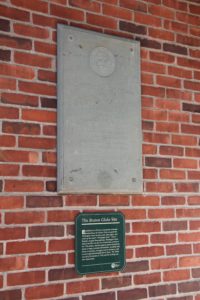
Newspaper Row
Boston, MA 02111 United States
Largely on Washington Street but also on some of the surrounding streets.
Once, Washington Street between State and Milk Streets would have been packed with people standing shoulder to shoulder, listening to the news. Perhaps, as happened in 1925, the Pittsburg Pirates and the Washington Senators are facing off in the World Series; the street is a sea of derbies and fedoras as the score is announced by a megaphone and on chalkboards, the various periodicals along Newspaper Row all competing to break the news first. Perhaps, as forty years later, though the area has already begun to lose some of its major papers, passersby form a crowd around the windows of the Globe, which has announced the assassination of John F. Kennedy with a handwritten sign, reading “President is dead.”
In the heyday of print newspapers, as many as seventeen publications lined Washington Street, from the State House to the Old South Meeting House. Some, such as the Boston Evening Transcript, for which the Transcript Building is named, have been forgotten. Others, such as the Boston Globe, continue to publish today (though the Globe headquarters are now in Dorchester). Other major papers included the Boston Post, which was the biggest newspaper in New England before it closed in 1956; the Boston Journal; the Boston Herald and the Boston Traveler, the latter of which was acquired by the former in 1912; the Boston Daily Advertiser, and many more.
The area around Newspaper Row was famous at the time for being a mix of politicians, lawyers, newspapermen, cops, bootleggers, and of course, the public. It was bisected by the famous Pi Alley, so named for the dropped “pied type,” left over from the old typeset printing presses. The modern printing presses were kept below ground—the Post’s was seven floors down, beside the subway, and could still make the buildings shake, printing papers for a million subscribers.
With the growing popularity of radio and TV in the 1950s, many of the newspapers formerly on Washington Street either folded or moved out of Boston’s central—and expensive—real estate. A final headline hanging outside what had been the Globe offices read, “Globe says Goodbye to Newspaper Row.”

Upcoming Events
- There were no results found.
Events List Navigation
Events List Navigation
Did You Know?
Certain books were “banned in Boston” at least as far back as 1651, when one William Pynchon wrote a book criticizing Puritanism.